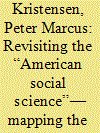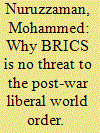| Srl | Item |
| 1 |
ID:
140874


|
|
|
|
|
| Summary/Abstract |
This paper studies the geography of the International Relations (IR) discipline, particularly the notion that IR is an “American social science.” First, it analyzes bibliometric data and finds that US-based scholars continue to dominate IR journals, but also that IR is one of the least US-dominated social sciences and that it has become markedly less so since the 1960s. Second, the paper argues that conventional measures based on nation-state affiliation capture only part of the spatial structures of inequality. It employs novel visualization tools to present an alternative map of elite stratification in IR. Instead of looking at national cores and peripheries, it maps the social network structures of authorship and coauthorship in key IR journals. By mapping city and institutional output, it finds stratification structures within the American discipline. Elite institutions in Northeast America, rather than “America,” dominate the field's leading journals. A similar stratification is found in Western Europe. Moreover, network linkages in terms of both coauthorships and doctoral backgrounds tie these Northeast American and West European elites together. The paper concludes that while US dominance in IR journals is in decline, this has not yet made the discipline as international as its name warrants.
|
|
|
|
|
|
|
|
|
|
|
|
|
|
|
|
| 2 |
ID:
170653


|
|
|
|
|
| Summary/Abstract |
BRICS (Brazil, Russia, India, China and South Africa) has emerged as a powerful economic group in the global economy and politics, apparently posing threats to the survival of the post-war liberal world order. Its member states (Brazil, Russia, India, China and South Africa) are seeking to democratize the post-war liberal world order to increase their shares of voting power in the decision-making processes of the Bretton Woods institutions and thus curb the USA’s dominance over global economic and financial architecture and eventually overhaul the US-led liberal world order. Contrary to the fear of many Western policymakers and analysts, this article contends that BRICS poses no credible threats to the US-led post-war order. The BRICS group’s potential to challenge or threaten the US-led world order is seriously undermined by the internal make-up of the group, its political and ideological heterogeneity, its incapacity to develop a collective world order vision salable to the wider international community and the lack of strong convergence in foreign policy goals and preferences.
|
|
|
|
|
|
|
|
|
|
|
|
|
|
|
|